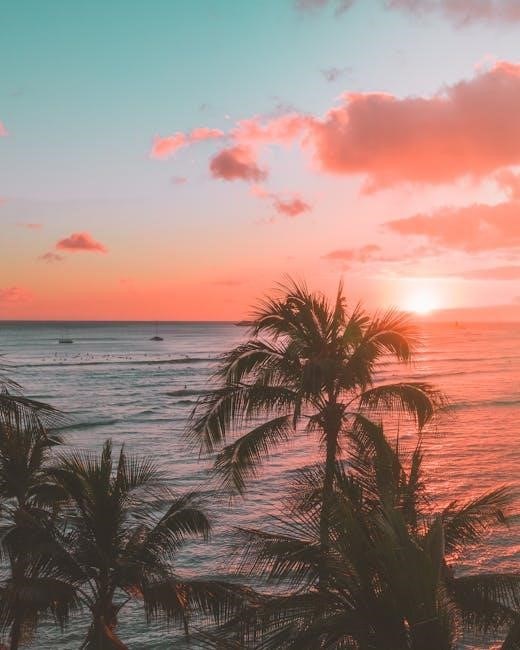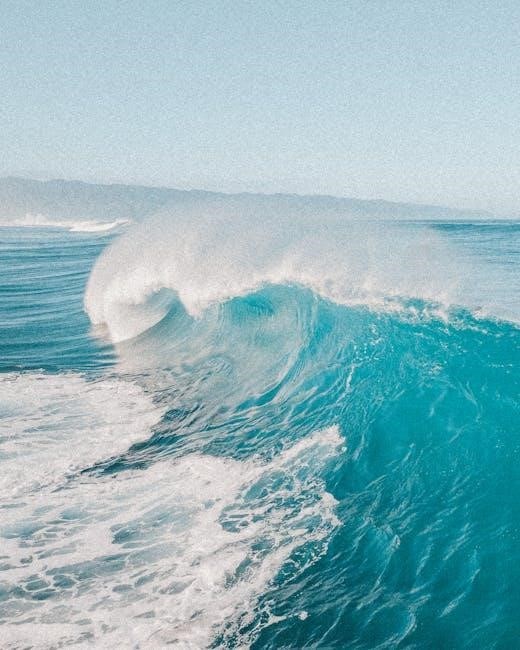Hawaii condo living offers a unique blend of luxury and convenience, with stunning ocean views and modern amenities․ Explore Oahu, Maui, Kauai, and the Big Island’s vibrant condo communities, perfect for both residents and vacationers seeking maintenance-free lifestyles in paradise;
Overview of Condo Popularity in Hawaii
Hawaii’s condo market has grown in popularity due to its desirable locations, luxury amenities, and maintenance-free lifestyle․ Areas like Waikiki, Kaka’ako, and Kihei are hotspots, offering ocean views and resort-like living․ Condos appeal to both locals and vacationers, providing affordability and convenience․ The trend toward urbanization and resort-style amenities has fueled demand, making condos a sought-after option in Hawaii’s real estate market․
Benefits of Condo Ownership in Hawaii

Owning a condo in Hawaii offers numerous benefits, including stunning ocean views, resort-like amenities, and a maintenance-free lifestyle․ Condo communities provide access to pools, gyms, and spas, enhancing residents’ lifestyles․ Proximity to beaches and vibrant neighborhoods like Waikiki and Kihei adds to their appeal․ Additionally, condos are often more affordable than single-family homes, making them an attractive option for both first-time buyers and investors․ The convenience of lock-and-go living is particularly advantageous for those who value flexibility and ease of ownership in a tropical paradise․

Popular Condo Locations in Hawaii
Hawaii’s popular condo locations include Oahu’s Waikiki, Maui’s Kihei, Kauai’s Poipu, and the Big Island’s Kona․ These areas offer prime beach access and modern amenities․
Oahu Condo Market: Key Areas and Developments
Oahu’s condo market is thriving, with key areas like Waikiki, Kaka’ako, and Honolulu offering a mix of luxury and affordability․ Waikiki remains a top choice for oceanfront condos, while Kaka’ako is buzzing with new developments, blending urban living with modern amenities․ The Hawaii Kai area is popular for its family-friendly condos with access to marinas and parks․ Recent developments in Kaka’ako, such as the Ritz Carlton Waikiki, showcase high-end living, while older buildings in areas like Makiki provide more affordable options․ Oahu’s diverse condo market caters to various lifestyles, from beachfront relaxation to vibrant city life․

Maui Condo Communities: Lifestyle and Amenities

Maui’s condo communities offer a luxurious island lifestyle, with many located in prime spots like Kihei, Lahaina, and Kaanapali․ These areas provide stunning ocean views, proximity to beaches, and access to top-tier amenities․ Condos in Kihei, such as the Maui Banyan, feature modern renovations and resort-style pools․ The Maui Sunset complex in Kihei is another standout, offering well-equipped units and a relaxed atmosphere․ Many communities include amenities like spas, fitness centers, and BBQ areas, enhancing the tropical living experience․ With a focus on relaxation and convenience, Maui condos cater to both full-time residents and vacationers seeking a serene retreat․

Kauai and Big Island Condo Opportunities
Kauai and the Big Island offer diverse condo opportunities, blending natural beauty with modern convenience․ On Kauai, areas like Poipu and Koloa feature condos near beaches and golf courses, such as Kiahuna Golf Club․ The Big Island boasts a range of options, from luxury resorts in Waikoloa to affordable units in Kona․ Condos often include amenities like pools, spas, and ocean views, making them ideal for both residents and investors․ These islands provide a mix of tranquility and adventure, with access to outdoor activities like hiking and snorkeling․ Whether seeking relaxation or exploration, Kauai and the Big Island offer condo living that captures the essence of Hawaiian paradise․

Buying a Condo in Hawaii: A Step-by-Step Guide
Research neighborhoods, select a project, review contracts, and understand deposit schedules․ Ensure proper due diligence and seek professional guidance for a smooth purchasing process in Hawaii․
Understanding the Condo Buying Process
Buying a condo in Hawaii involves several steps, starting with researching neighborhoods and properties․ Identify your needs, such as location, size, and amenities; Once a property is selected, review the contract thoroughly, understanding deposit schedules and cancellation rights․ Due diligence is crucial, including examining condo documents and disclosures․ Engage professionals like real estate agents and attorneys to navigate local regulations․ Stay informed about market trends and financing options to ensure a smooth transaction․ Proper planning and expert guidance are essential for a successful condo purchase in Hawaii’s unique real estate market․
Financing Options for Hawaii Condo Purchases
Financing a condo in Hawaii offers diverse options, including conventional loans, FHA loans, VA loans, and jumbo loans for higher-priced properties․ Local and national lenders provide competitive mortgage rates, with some offering special programs for first-time buyers or Hawaii residents․ Down payment requirements vary, typically ranging from 3% to 20%, depending on the loan type and property value․ Credit score requirements are also a factor, with better scores securing lower interest rates․ Additionally, some condos may offer seller financing or lease-to-own arrangements․ Consulting with a mortgage broker or financial advisor is highly recommended to navigate the process and secure the best terms for your condo purchase in Hawaii․
New Construction vs․ Resale Condos: Pros and Cons
Choosing between new construction and resale condos in Hawaii involves weighing key factors․ New condos offer modern designs, energy efficiency, and warranties, often in prime locations like Oahu’s Kakaako or Maui’s Kihei․ They may also provide tax benefits and lower maintenance costs initially․ However, they can be more expensive and may require a longer wait for completion․ Resale condos are typically more affordable and available for immediate occupancy, allowing buyers to see the finished product․ They might also offer established communities and amenities․ Both options have their advantages, and the decision depends on budget, preferences, and long-term goals․ Researching market trends and consulting real estate experts can help make an informed choice․

Legal and Financial Considerations
Understanding condo documents, disclosure requirements, and financial obligations is crucial․ Reviewing fees, taxes, and legal regulations ensures informed decisions when purchasing or owning a condo in Hawaii․
Importance of Condo Documents and Disclosure
Reviewing condo documents and disclosures is essential for buyers to understand ownership terms, fees, and potential risks․ These documents include CC&Rs, bylaws, and financial statements․ Disclosure requirements ensure transparency about the property’s condition, ongoing litigation, and special assessments․ Ignoring these details can lead to unexpected costs or legal issues․ Recent updates, such as Hawaii’s revised condo document access rules in March 2023, highlight the importance of staying informed; Buyers should carefully examine all provided materials and seek legal advice if necessary․ Proper disclosure also protects sellers from future disputes․ Understanding these documents ensures a smooth transaction and peaceful ownership experience in Hawaii’s competitive condo market․

Hawaii Real Estate Laws and Regulations
Hawaii real estate laws and regulations are designed to protect buyers, sellers, and owners․ The state enforces strict disclosure requirements, ensuring transparency in transactions․ Condo buyers must receive detailed documents, including financial statements and meeting minutes․ Hawaii’s real estate commission oversees licensing and compliance, ensuring agents operate ethically․ Laws also address unique aspects like oceanfront property rights and environmental regulations․ Financing options must comply with state and federal mortgage laws․ Understanding these regulations is crucial for a smooth transaction․ Buyers should consult legal experts to navigate complexities․ Staying informed about updates to Hawaii’s real estate laws ensures compliance and avoids potential disputes․ Proper adherence to these regulations safeguards investments and promotes fair practices in the condo market․
Condo Fees and Tax Implications
Condo fees in Hawaii cover maintenance, amenities, and services, varying by location and property size․ Average fees range from $300 to $1,000 monthly, depending on the building’s amenities․ These fees often include utilities, landscaping, and shared facilities like pools or gyms․ Tax implications for condo owners in Hawaii are relatively favorable, with lower property taxes compared to mainland states․ However, condos may be subject to additional assessments or special taxes for improvements․ Understanding these costs is crucial for budgeting․ Buyers should review condo documents and consult a tax professional to fully understand their financial obligations․ Proper planning ensures a smooth transition into condo ownership in Hawaii’s unique real estate market․
Condo Maintenance and Management
Hawaii condos often feature shared spaces like pools and landscaping, with maintenance responsibilities split between owners and property management companies, ensuring a well-maintained living environment for residents․
Role of Homeowners Associations (HOA)
In Hawaii, Homeowners Associations (HOA) play a pivotal role in managing condo communities․ They are responsible for maintaining shared spaces, enforcing community rules, and ensuring property values remain high․ HOAs collect fees from residents to fund repairs, landscaping, and amenities like pools or gyms․ They also organize meetings to address concerns and make decisions for the benefit of all residents․ Proper HOA management is essential for fostering a harmonious and well-maintained living environment․ Prospective buyers should review HOA documents to understand their role and financial obligations before purchasing a condo in Hawaii․
Maintenance Responsibilities and Costs
In Hawaii condos, maintenance responsibilities are shared between owners and the HOA․ Owners typically handle interior repairs and upgrades, while the HOA manages common areas like pools, landscaping, and building exteriors․ Costs vary by property, with monthly fees covering shared maintenance․ For example, cleaning fees and security deposits are common, while some condos charge extra for amenities like pool heat․ Buyers should review HOA documents to understand their financial obligations․ Proper maintenance ensures the property retains its value and provides a desirable living environment․ Regular upkeep is crucial in Hawaii’s tropical climate to prevent issues like mold and pest infestations․
Property Management Companies: What to Expect
Property management companies in Hawaii handle day-to-day operations, ensuring condos are well-maintained and tenant issues are resolved promptly․ They oversee maintenance, handle lease agreements, and manage financial aspects like rent collection․ Some companies also assist with vacation rentals, coordinating bookings and cleaning services․ When selecting a management firm, consider their reputation, services offered, and fees․ Many companies provide online platforms for owners to track property performance․ It’s essential to choose a reliable company to maximize rental income and maintain property value․ They often have local knowledge, which helps in navigating Hawaii’s unique real estate market and regulations․ Effective management ensures a smooth experience for both owners and tenants․
Hawaii condo living offers a perfect blend of lifestyle, convenience, and natural beauty․ From ocean views to vibrant communities, condos provide an ideal way to experience Hawaii’s unique charm and opportunities․
Final Tips for Prospective Condo Buyers
When considering a condo in Hawaii, research neighborhoods thoroughly to match your lifestyle․ Review condo documents and fees to understand costs․ Work with knowledgeable real estate agents and attorneys to navigate legal requirements․ Prioritize properties with strong HOA management and maintenance track records․ Consider future resale value and rental potential․ Consider new constructions for modern amenities or resales for established communities․ Explore financing options tailored to condo purchases in Hawaii․ Plan for additional costs like taxes and special assessments․ Visit properties in person to assess condition and location․ Finally, ensure all paperwork is reviewed carefully to avoid surprises․ Hawaii condo living can be rewarding with proper planning and research․